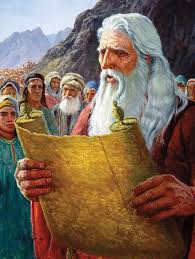The Book of the Covenant
20:18 to 23:33

The laws in this section are called the Book of the Covenant based on that phrase in 24:7. They are different and distinct from the Ten Commandments. They were written by the hand of Moshe and not from the hand of God. Moses presented the commandments on behalf of God to the people (21:1). The Hebrew word mishpat means to judge or to rule, and implies a law that rests upon prior precedent. Therefore, compared with Suzerainty Treaties, the Torah had specific conditions; these are laid out in the Book of the Covenant. Other specific social and economic issues are also mentioned in Deuteronomy 12:1 to 26:15.
The Ten Commandments are short and cover much ground, they were given to the whole nation on the same occasion, and although they are the most concise code of law, they cover most of the main diverse and moral challenges of a human being. However, to administer a nation, a people, it takes a much more detailed and elaborate code of law that addresses such issues as dealing with slaves that you employ in your household, or with a neighbor’s ox that fell into a pit, or with two men fighting in a public place and one of them puts out the eye of the other, or hits a pregnant woman and she loses her baby, or someone has taken land and appropriated this land for himself and was preparing to build a house on that land. In other words, Moses is adding to the skeleton of the Ten Commandments, flesh and sinew.
This means that the Book of the Covenant is made up of descriptive commandments that met the needs of the new budding nation of Isra’el. But it also had descriptive commandments that were based upon the prescriptive law of the Ten Commandments. For example, in 22:1 we see a commandment dealing with the repayment for the theft of another’s animals. That was based upon the principle of the Eighth Commandment: You shall not steal (20:5). In other words, the Ten Commandments emphasize the fundamental legal principles for any society to function properly. Those principles are just as valid today as they were when Moshe brought them down from Mount Sinai. The principles of the Book of the Covenant, like the Ten Commandments, are a blueprint for living for us today.



Leave A Comment